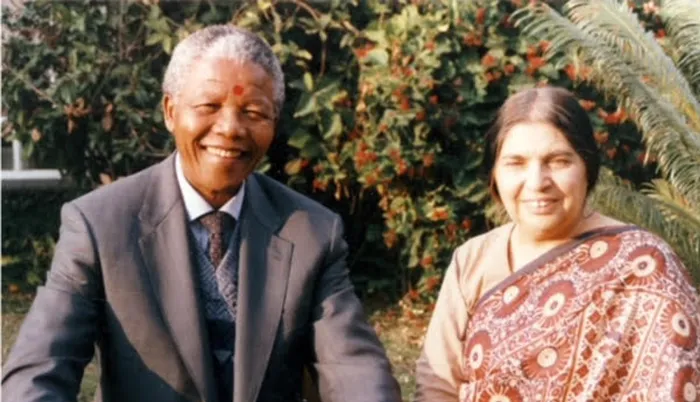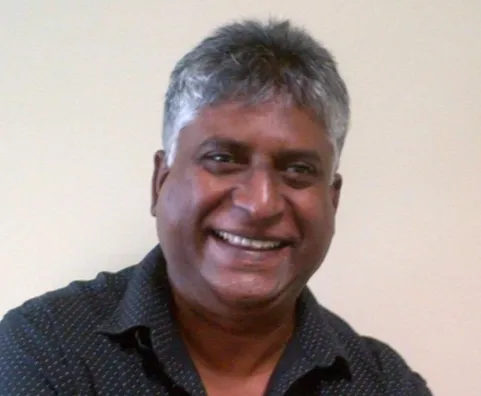Mandela Month: a living legacy of ubuntu, unity, and transcendent humanity
Transformative potential

Nelson Mandela with Fatima Meer.
Image: File
AS WE CELEBRATE Mandela Month, we are called to reflect not merely on historical remembrance but to embody Madiba’s enduring vision of a society rooted in Ubuntu - that profound African philosophy declaring, "I am because we are."
In a world still fractured by division, inequality, and discrimination, Mandela’s life offers us both a mirror and a map, revealing humanity’s capacity for both oppression and extraordinary redemption.
Centred around Nelson Mandela’s birthday today (July 18), this annual observance transcends mere commemoration. It is a global call to action, a reminder of the power of individuals to shape a better world amid strife and discord. Mandela Month underscores the transformative potential of empathy, forgiveness, and collective action.
Nelson Mandela’s enduring legacy
Nelson Rolihlahla Mandela, affectionately known as Madiba, left an indelible mark on history as an anti-apartheid revolutionary, political prisoner, and South Africa’s first democratically elected president. His multifaceted legacy continues to resonate globally.
The boy who became a bridge
Born in 1918, the young Thembu cattle herder would become what President Obama called "the last great liberator of the 20th century."
His journey mirrored history’s greatest transformers - Gandhi’s Satyagraha, Martin Luther King Jr.’s moral courage, and Lincoln’s unifying vision. Yet Mandela’s 27 years in prison forged something unparalleled: a leader who emerged not with bitterness, but with a revolutionary philosophy of transcending discrimination.
The Indian connection: shared struggle, shared spirit
Mandela’s relationship with South Africa’s Indian community - and with India itself - was profound, shaped by shared oppression and a commitment to nonviolent resistance, inspired by Mahatma Gandhi.
Gandhi's enduring influence:
Mandela often called Gandhi his "political guru" and "role model." It was in South Africa that Gandhi first developed Satyagraha (truth-force), a philosophy that deeply influenced Mandela. In his early Robben Island diaries, Mandela acknowledged the Indian community’s pivotal role in South Africa’s resistance movement.
The 1952 Defiance Campaign, a turning point in the anti-apartheid struggle, drew heavily on Gandhian civil disobedience. Beyond politics, Mandela formed personal bonds with Indian leaders like IC Meer, JN Singh, and Yusuf Dadoo - allies in the struggle. His 26-year imprisonment alongside Ahmed Kathrada symbolised their unbreakable kinship.
This was no mere political alliance but a spiritual connection, rooted in:
- Gandhi’s legacy of nonviolence.
- Shared colonial oppression
- The Dharma principle of seeing divinity in all beings.
As Mandela declared:
"I have fought against white domination, and I have fought against black domination. I have cherished the ideal of a democratic and free society where all live in harmony."
This was Ubuntu in action - unity without uniformity.
The anatomy of ubuntu leadership
Mandela’s leadership defied convention, embodying what Obama termed "that truth within ourselves." His spiritual compass guided him toward:
1. Radical Forgiveness – Inviting his jailers to his presidential inauguration.
2. Sacrificial Service – Declaring at his trial, "If needs be, I am prepared to die."
3. Inclusive Vision – Wearing the Springbok jersey to unite a fractured nation. His reflections in "Conversations With Myself" remain timeless: "The foundation of spiritual life? Honesty, simplicity, humility, pure generosity, absence of vanity, readiness to serve others—qualities within every soul’s reach."
Can we truly transcend discrimination?
In an era of deepening divides, Mandela’s legacy poses urgent questions:
- Is "being beyond discrimination" possible today?
- Can we honor Sanatana Dharma’s Oneness amid diversity?
- Will we pursue material success or spiritual significance?
The answer lies in Mandela’s example:
- Yes, when justice becomes love in action.
- Yes, when leadership means lifting others.
- Yes, if we embrace his truth: "A good head and a good heart are always a formidable combination."
The Mandela month challenge
Mandela Month - and particularly Mandela Day (July 18) - is more than a holiday. It is an invitation to serve, unite, and inspire change. The UN declared it Nelson Mandela International Day in 2009, honoring his commitment to justice, human rights, and peace.
The core message:
"Take Action; Inspire Change; Make Every Day a Mandela Day."
People worldwide are encouraged to devote 67 minutes (symbolising Mandela’s 67 years of public service) to:
- Volunteer work- Community upliftment.
- Advocacy for social justice.
This July, let us move beyond ritual to revolution:
- Serve – Give 67 minutes, then make it a lifelong practice.
- Unite – Build bridges where walls once stood.
- Embody– Let Ubuntu guide daily choices.
For in Mandela’s words: "It is in your hands to create a better world for all."
Let us honor him not just by memory, but by how we live. As he said: "What counts in life is not the mere fact that we have lived. It is what difference we have made to the lives of others."

Siva Naidoo
Image: Supplied
Siva Naidoo is social justice activist and the Training Coordinator of Ubuntu Human Values Advocacy Group. [email protected]
** The views expressed do not necessarily reflect the views of IOL or Independent Media.
Related Topics: